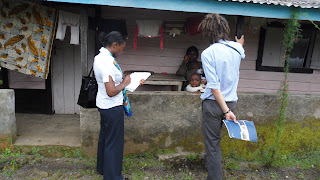Although there is a huge debate on effectiveness of decentralisation in Primary Health Care especially on the issue of capacity for management at the grass root (rural or village levels), discussions with community members revealed willingness to take responsibility of their health with increased awareness.
For instance people who used eye care facilities were people who had knowledge of the care for the eyes. Indeed, they were mostly of higher economic status than most in the remote areas.
This also identified socio-economic status as another determinant for engaging in health. However new pilot schemes to address financial barriers to accessing health care such as the Community Based Health Insurance (CBHI) pre-payment schemes has been introduced in some of these areas, there is limited awareness of benefits of such schemes to the community who it is meant to serve.

Key finding was poor sensitisation on health care and its services especially for people in the informal sector is a major barrier to community engagement.
The research suggested that program implementers should ensure effective community sensitisation using right mediums as most rural dwellers have limited access to electronic media hence rely on local mediums such as 'town criers' to access information. Other communication strategies could be explored to ensure these health services gets to those most in need and therefore increase uptake in utilisation.
For instance people who used eye care facilities were people who had knowledge of the care for the eyes. Indeed, they were mostly of higher economic status than most in the remote areas.
This also identified socio-economic status as another determinant for engaging in health. However new pilot schemes to address financial barriers to accessing health care such as the Community Based Health Insurance (CBHI) pre-payment schemes has been introduced in some of these areas, there is limited awareness of benefits of such schemes to the community who it is meant to serve.

Key finding was poor sensitisation on health care and its services especially for people in the informal sector is a major barrier to community engagement.
The research suggested that program implementers should ensure effective community sensitisation using right mediums as most rural dwellers have limited access to electronic media hence rely on local mediums such as 'town criers' to access information. Other communication strategies could be explored to ensure these health services gets to those most in need and therefore increase uptake in utilisation.



its good to know that the whole community is taking initiatives to promote eye health. Good job.
ReplyDeleteEye Clinic in Mumbai
Indeed although sensitisation still poses a challenge in most rural areas- on how to access affordable early care thereby hindering update of eye care services. A lot of underpinnig issues to address in relation to accessing eye health care especially where available and financing
DeleteThanks for sharing information that community is about to care for eye.
ReplyDeletenice post.
Femto Lasik
Our pleasure to share! Thanks for the comment too.
Deleteincluding reasonable comments here... https://yaldoeyecenter.com/
ReplyDeleteThanks!
DeleteThanks for informing. Participation in health camps really matters. Latisse Online is the best way to improve eye health.
ReplyDeleteGreat! Thanks for sharing
Delete